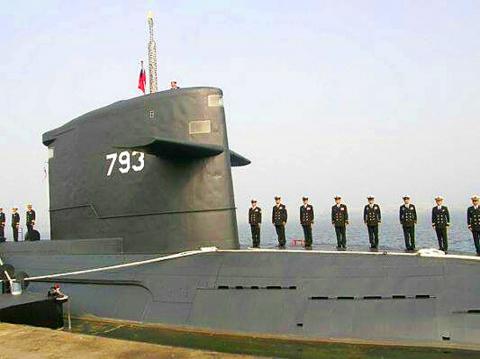The US Department of State has approved a marketing license needed for US manufacturers to sell technology to Taiwan that would enable the nation to build domestic submarines, the Ministry of National Defense said yesterday.
Ministry spokesman Major General Chen Chung-chi (陳中吉) said in an interview that the ministry has received reports that the state department has agreed to grant the marketing license required for the sale of technology that Taiwan needs to develop indigenous submarines.
Presidential Office spokesman Sidney Lin (林鶴明) confirmed the report, saying that the State Department notified Taiwan’s representative office in the US that it would provide the license.

Photo Courtesy of the Ministry of National Defense
This decision would not only help upgrade Taiwan’s self-defense capabilities, but would also benefit regional safety and security, Lin said.
The Presidential Office and the ministry thanked the US for its commitment to the Taiwan Relations Act and the “six assurances.”
“As a result, Taiwan will become more militarily self-sufficient,” the ministry said.
Democratic Progressive Party Legislator Wang Ding-yu (王定宇), who sits on the legislature’s Foreign Affairs and National Defense Committee, also thanked the State Department for “making a righteous decision” and supporting Taiwan, “a nation with democratic values the same as those of the US.”
Wang said he hopes that remaining talks go smoothly, adding that he is very optimistic about the nation’s indigenous submarine-building program following a visit to a shipyard last week.
“The nation’s defense program most needs to improve its underwater combat capabilities, which it should have done 10 years ago,” he said. “The nation’s development of submarines is already 20 years behind schedule, but better late than never.”
“The announcement from the US is the first step. Whether we are talking about components, systems or other technology, US manufacturers would still need to obtain export permits,” Wang said. “Nevertheless, this act from the US Department of State is a great start.”
The friendliness shown toward Taiwan by both the US Senate and House of Representatives is historically the best it has ever been, he said.
The US is taking care of the combat systems the nation’s submarines would use, and if export permission for those systems is granted, the nation’s submarine program would be ready for action, he said.
Once basic blueprints for the submarines are complete, schematics can be worked out, Wang said, adding that export permission for the components would take about one year to acquire.
After components are received, production and assembly can begin, he said, adding that work should be completed according to schedule and the quality and combat-effectiveness of the finished submarines is expected to be excellent.

The combined effect of the monsoon, the outer rim of Typhoon Fengshen and a low-pressure system is expected to bring significant rainfall this week to various parts of the nation, the Central Weather Administration (CWA) said. The heaviest rain is expected to occur today and tomorrow, with torrential rain expected in Keelung’s north coast, Yilan and the mountainous regions of Taipei and New Taipei City, the CWA said. Rivers could rise rapidly, and residents should stay away from riverbanks and avoid going to the mountains or engaging in water activities, it said. Scattered showers are expected today in central and

COOPERATION: Taiwan is aligning closely with US strategic objectives on various matters, including China’s rare earths restrictions, the Ministry of Foreign Affairs said Taiwan could deal with China’s tightened export controls on rare earth metals by turning to “urban mining,” a researcher said yesterday. Rare earth metals, which are used in semiconductors and other electronic components, could be recovered from industrial or electronic waste to reduce reliance on imports, National Cheng Kung University Department of Resources Engineering professor Lee Cheng-han (李政翰) said. Despite their name, rare earth elements are not actually rare — their abundance in the Earth’s crust is relatively high, but they are dispersed, making extraction and refining energy-intensive and environmentally damaging, he said, adding that many countries have opted to

SUPPLY CHAIN: Taiwan’s advantages in the drone industry include rapid production capacity that is independent of Chinese-made parts, the economic ministry said The Executive Yuan yesterday approved plans to invest NT$44.2 billion (US$1.44 billion) into domestic production of uncrewed aerial vehicles over the next six years, bringing Taiwan’s output value to more than NT$40 billion by 2030 and making the nation Asia’s democratic hub for the drone supply chain. The proposed budget has NT$33.8 billion in new allocations and NT$10.43 billion in existing funds, the Ministry of Economic Affairs said. Under the new development program, the public sector would purchase nearly 100,000 drones, of which 50,898 would be for civil and government use, while 48,750 would be for national defense, it said. The Ministry of

UNITED: The other candidates congratulated Cheng on her win, saying they hoped the new chair could bring the party to victory in the elections next year and in 2028 Former Chinese Nationalist Party (KMT) lawmaker Cheng Li-wun (鄭麗文) yesterday won the party’s chair election with 65,122 votes, or 50.15 percent of the votes. It was the first time Cheng, 55, ran for the top KMT post, and she is the second woman to hold the post of chair, following Hung Hsiu-chu (洪秀柱), who served from 2016 to 2017. Cheng is to succeed incumbent Eric Chu (朱立倫) on Nov. 1 for a four-year term. Cheng said she has spoken with the other five candidates and pledged to maintain party unity, adding that the party would aim to win the elections next year and